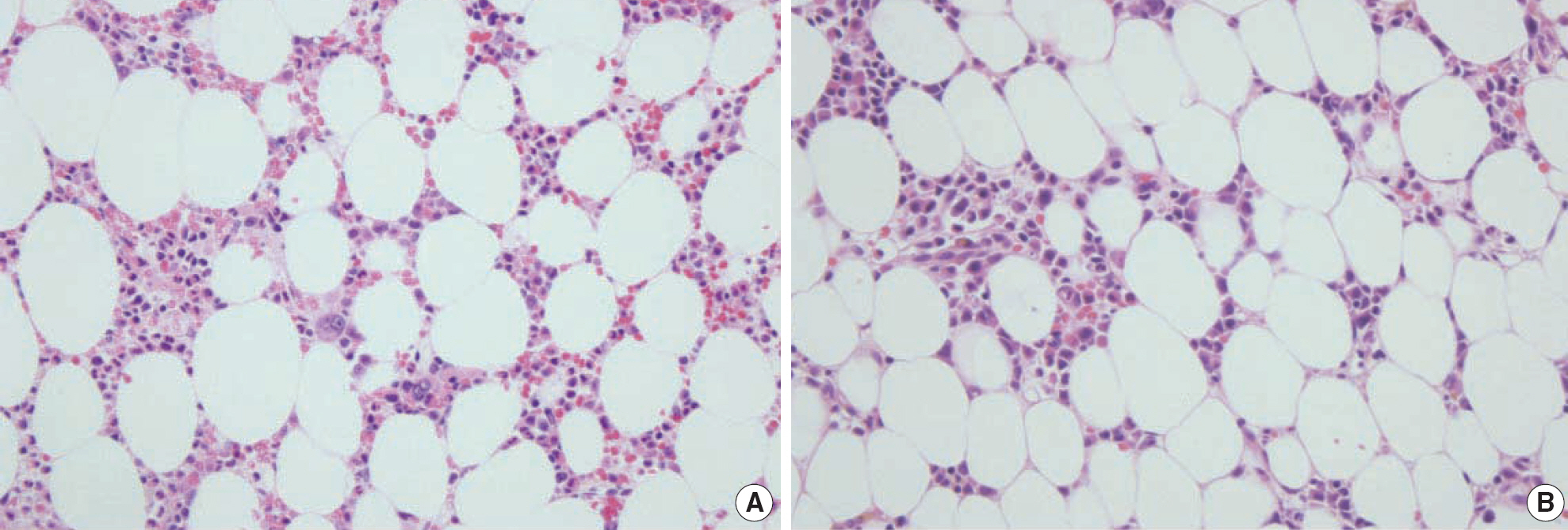Korean J Lab Med.
2010 Jun;30(3):244-248. 10.3343/kjlm.2010.30.3.244.
Acquired Amegakaryocytic Thrombocytopenia after Thymectomy in a Case of Pure Red Cell Aplasia Associated with Thymoma
- Affiliations
-
- 1Department of Laboratory Medicine, College of Medicine, Chung-Ang University, Seoul, Korea. chayoung@cau.ac.kr
- 2Department of Internal Medicine, College of Medicine, Chung-Ang University, Seoul, Korea.
- 3Personalized Tumor Engineering Research Center (PTERC), College of Medicine, Chungbuk National University, Cheongju, Korea.
- KMID: 1781622
- DOI: http://doi.org/10.3343/kjlm.2010.30.3.244
Abstract
- The association of thymoma with pure red cell aplasia has been well documented, but amegakaryocytic thrombocytopenia is not a recognized paraneoplastic syndrome complicating thymoma. We report a case of thymoma-complicated pure red cell aplasia and amegakaryocytic thrombocytopenia in a 73-yr-old woman. Pure red cell aplasia was diagnosed seven months after the detection of thymoma. One year after the diagnosis of pure red cell aplasia and seven months after thymectomy, bone marrow aspiration and biopsy showed an absence of megakaryocytes, marked erythroid hypoplasia with normal myeloid series. A diagnosis of amegakaryocytic thrombocytopenia and pure red cell aplasia was made. Oral steroid maintenance therapy resulted in recovery of platelet count. She has still transfusion-dependant anemia but platelet and neutrophil counts had been maintained in normal range for more than five months, until the last follow-up. We think that autoreactive T cells may induce a clinical autoimmune response even after eradication of thymoma, and aplastic anemia as a late complication following thymectomy was described in previous cases. This patient also has to be under a close observation because of the possibility to evolve into aplastic anemia.
MeSH Terms
-
Aged
Bone Marrow/pathology
Female
Humans
Imidazoles/therapeutic use
Megakaryocytes/pathology
Pregnadienetriols/therapeutic use
Red-Cell Aplasia, Pure/complications/*diagnosis
Thrombocytopenia/*diagnosis/drug therapy/*etiology
Thymectomy/*adverse effects
Thymoma/*complications/diagnosis/surgery
Thymus Neoplasms/*complications/diagnosis/surgery
Figure
Reference
-
1.Thomas CR., Wright CD., Loehrer PJ. Thymoma: state of the art. J Clin Oncol. 1999. 17:2280–9.
Article2.Johnson SB., Eng TY., Giaccone G., Thomas CR Jr. Thymoma: update for the new millennium. Oncologist. 2001. 6:239–46.3.Coplu L., Selcuk ZT., Haznedaroglu IC., Dogan R., Gungen Y. Aplastic pancytopenia associated with thymoma. Ann Hematol. 2000. 79:648–50.4.Maslovsky I., Gefel D., Uriev L., Ben Dor D., Lugassy G. Malignant thymoma complicated by amegakaryocytic thrombocytopenic purpura. Eur J Intern Med. 2005. 16:523–4.
Article5.Rosai J, Sobin LH, editors. World Health Organization. Histological typing of tumors of the thymus. 2nd ed.Berlin: Springer-Verlag;1999. 9-15. (International histological classification of tumors).6.Masaoka A., Monden Y., Nakahara K., Tanioka T. Follow-up study of thymomas with special reference to their clinical stages. Cancer. 1981. 48:2485–92.
Article7.Jameson SC., Hogquist KA., Bevan MJ. Positive selection of thymocytes. Annu Rev Immunol. 1995. 13:93–126.
Article8.Muller-Hermelink HK., Wilisch A., Schultz A., Marx A. Characterization of the human thymic microenvironment: lymphoepithelial interaction in normal thymus and thymoma. Arch Histol Cytol. 1997. 60:9–28.9.Ritchie DS., Underhill C., Grigg AP. Aplastic anemia as a late complication of thymoma in remission. Eur J Haematol. 2002. 68:389–91.
Article10.Tristano AG. Acquired amegakaryocytic thrombocytopenic purpura: review of a not very well-defined disorder. Eur J Intern Med. 2005. 16:477–81.
Article11.Ueda K., Matsubara A., Kizuki N., Sato Y., Oka Y., Hosaka T. Successful treatment of acquired pure red cell aplasia and acquired amegakaryocytic thrombocytopenia with anti-thymocyte globulin. Am J Hematol. 2001. 66:154–5.
Article12.Azuno Y., Yaga K. Successful cyclosporin A therapy for acquired amegakaryocytic thrombocytopenic purpura. Am J Hematol. 2002. 69:298–9.
Article13.Hoffacker V., Schultz A., Tiesinga JJ., Gold R., Schalke B., Nix W, et al. Thymomas alter the T-cell subset composition in the blood: a potential mechanism for thymoma-associated autoimmune disease. Blood. 2000. 96:3872–9.
Article14.Spath-Schwalbe E., Arnold R., Flath B., Possinger K. Red cell aplasia and megakaryocytic hypoplasia with elevated counts of CD8-positive lymphocytes after resection of a thymoma responding to cyclosporine. Ann Hematol. 1998. 76:51–2.15.Nara N. Pure red cell aplasia as an autoimmune-mediated disorder. Intern Med. 2002. 41:507–8.
Article16.Shiozaki H., Miyawaki S., Kuwaki T., Hagiwara T., Kato T., Miyazaki H. Autoantibodies neutralizing thrombopoietin in a patient with amegakaryocytic thrombocytopenic purpura. Blood. 2000. 95:2187–8.17.Trisal V., Nademanee A., Lau SK., Grannis FW Jr. Thymoma-associated severe aplastic anemia treated with surgical resection followed by allogeneic stem-cell transplantation. J Clin Oncol. 2007. 25:3374–5.
Article
- Full Text Links
- Actions
-
Cited
- CITED
-
- Close
- Share
- Similar articles
-
- Pure Red Cell Aplasia Associated with Good Syndrome
- A Case of Pure Red Cell Aplasia Associated with Invasive Thymoma
- Pure Red Cell Aplasia Caused by Acute Hepatitis A
- A Case of T Cell Chronic Lymphocytic Leukemia Associated with Pure Red Cell Aplasia
- The Remission of Pure Red Cell Aplasia with a Thymoma after Surgical Resection



